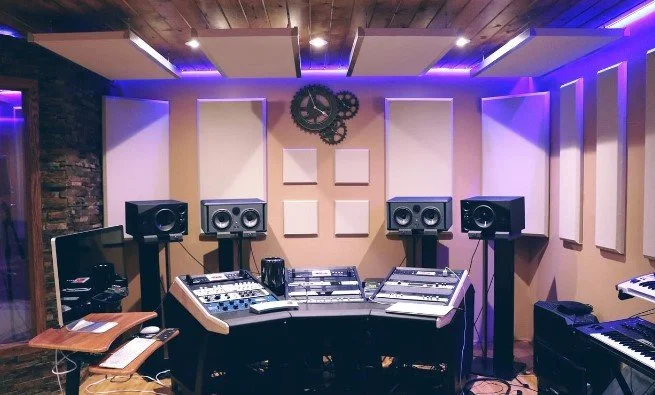For some creative firms, cultivating a personalized studio space for use with their daily productive operation is a milestone in how they manage and utilize their premises. There are several reasons as to why you might structure your own studio space. Such an effort may allow you to bring in clients for professional work, grant you an area in which to host green screen space for photography, or maybe a professional recording booth.
At the very least, this helsp you avoid having to rent out other spaces or spend time cultivating a studio that you don’t own only to repeat the process from scratch for each project you have.
That said, structuring a professional studio space as a small business is not always easy to plan for. This is because there are rarely any strict requirements for what a studio space should be, and even then, your needs for it might change depending on the current operational project being pursued.
In this post, we’ll discuss how to structure this space in the best way, and what effect it might have in the long term:
Ventilation & Fire Safety
Making the studio space compliant with safety regulations is of course the first step. We must ensure that it has its appropriate ventilation (this is important if using blackout techniques such a isolating windows), which can be achieved by appropriate units and extraction fans being installed. In some cases, this might involve machines that convert paint fumes back into neutral gases so that you’re not releasing toxins into the environment.
On top of this, fire safety is essential to consider. It’s very easy for a good deal of equipment to make navigability less easy to deal with when cultivating a studio environment. There are some good tips you can use to help with this, however. Making sure that the studio exist lights are properly illuminated is key, as is making sure all trip hazards are secured (such as by using raised platforms to make sure people can walk over wires easily).
No matter what the intent of designing your studio space is, it’s true to say that creative professionals thrive on efficiency. When we focus on the safety of our studio space, we make sure that projects can run smoothly.
Storage & Safe Lockup
It’s important to make sure you have your storage needs attended to if possible. Heavy duty industrial shelving racks can serve as a perfect example of this. These can store props, equipment, and other goods carefully, indexed in the appropriate manner. With a prop master or at least an inventory specialist able to make sure you have everything you need and the equipment cared for between tasks; you can make sure your investments pay dividends overtime.
Studio spaces tend to bring with them expensive equipment, from lighting gear to cameras to specific equipment used in artistic pursuits. Even quality green screen fabric can cost a lot of money, especially when purchased in large quantities. This is why implementing a secure inventory space with appropriate shelving and managed by a dedicated staff member is an excellent use of your time.
Soundproofing
Good soundproofing is similar to insulation, it must be placed in the walls, and it must accommodate for the location of the space. This may be more than necessary in studio recording spaces, especially if your building is close to other areas.
Furthermore, recording spaces often benefit from echo cancellation, which can be achieved through staggered foam installations on the walls, used to prevent sounds from bouncing around large spaces. Containing the sound in smaller rooms is often easier, which is why recording booths tend to be separate and more secure, away from the main production area.
Soundproofing not only improves the quality of your creative product, but allows you to avoid frustrating the businesses around you. Of course, soundproofing is only a limiting measure, it can never completely and totally remove sound from travelling. If you’re certain that intensive music production, theatre or stage recordings will be taking place, then making sure you choose a location less likely to cause problems is a great idea.
Foundational Staging
The foundational staging room of your studio space is how you designate the area you’ll work within, and that can be important for a variety of reasons. First, it allows you to define the space within which you’ll be recording or working, and second, it will give you specific dimensions from which to plan out the rest of your support installations.
This might involve key lights, back lights and soft lighting for photography. It might allow you to install speakers where the sound will carry in the best way, acoustically, through the room. It may be a space from which you can easily set up the green screen on the back draped wall. If letting out the space, then it might mean setting up a green room, refreshment area, or at least a cultivated space where staging floors can be constructed easily. Foundational staging, in this light, can help you cost and plan for the day to day realities of designing your studio room.
Recording Lights
Studio spaces are typically used for creative projects. This means that they require privacy, space, and relative quietness to abet that kind of work. This is why it’s a good idea to install recording on/off lights so that those outside of the room can seem it’s currently being occupied by professional work.
This way, you can make sure that the room stays as quiet and private as possible, and that distractions are minimized. A worthwhile schedule outside of the room showcasing the different bookings and projects being worked on can also aid with this.
This way, you can cultivate the compliance of your staff, and they can remain respectful of the space when it’s being used. This is also important if you rent usage of the space out, perhaps to local bands, because then their entourage is less likely to interfere with the creative process. It’s a small addition, but can make a big difference in the long run.
Necessary Insurance
It’s easy to forget about the financial security we need to employ when working with such expensive equipment - but it really does make a difference. Insurance of the contents, of specific equipment, and of liabilities can ensure that even if you rent out the studio space, you should be protected.
It’s also worthwhile to make sure that certain rights are understood in writing before accepting people onto your property, such as not accepting financial culpability for equipment brought in by various acts or talent. This way, you can avoid being on the hook for a situation that wasn’t your fault, or that your studio had not been prepared for.
Storage Transportation
Lifting lights, camera gear, staging sets and more is heavy work, and can take a good deal of time to get through. This is why it’s a great idea to focus on storage transportation to the degree that you can, in the safest and most effective manner.
Larger storage containers with wheels can be used to safely and reliably lift equipment, transporting it from room to room under lock and key. This way, you can make sure it remains safe in your warehouse until needing to be unlocked again. These larger storage units can also be utilized when transporting your wares to other studios or event spaces should you need to. As such, they’re a reliable investment for any firm to follow.
Technical Booths
In many cases, technical booths can be used for the main controllers, be that the production mixers, light fixtures, or stage controls. These should overlook the main staging or studio area and remain as private and secure as possible.
This way, your controller has the chance to switch off the production if necessary, or to pre-empt the staging arrangement for the development of a project, be that adjusting lighting for a photography shoot or making sure the levels for voice recording are properly met. Structuring enough of a space for comfortable management is key. An intercom system can also allow for clear and consistent communication between partitions.
With this advice, we hope you can see that even as a small firm structuring a studio space, there are many options to play with in order ot help you offer value to your clients, or to refine your creative capabilities. When you focus on safety first, compound your property storage utilities, soundproof and stage the space as appropriate, ensure recording lights are set up, as well as insure, curate storage and implement a technical booth, you’ll be in the best position to move forward.
As more and more firms (such as marketing firms) are starting to value the ability for creative development in-house, this is hard advice limited only to businesses primarily in the creative space. For a thorough investment that justifies years-long use of this studio space, you may just save double that in funds you would have otherwise outsourced.






